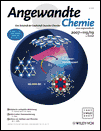Angewandte Chemie
Angewandte Chemie (German pronunciation: [ˈʔaŋɡəˌvantə çeˈmiː], meaning "Applied Chemistry") is a weekly peer-reviewed scientific journal that is published by Wiley-VCH on behalf of the German Chemical Society (Gesellschaft Deutscher Chemiker). Publishing formats include feature-length reviews, short highlights, research communications, minireviews, essays, book reviews, meeting reviews, correspondences, corrections, and obituaries. This journal contains review articles covering all aspects of chemistry. In 2018 its impact factor was 12.257, and it was ranked 17th out of 172 in the subject category "chemistry, multidisciplinary."[1]
 | |
| Discipline | Chemistry |
|---|---|
| Language | German, English |
| Edited by | Neville Compton |
| Publication details | |
| History | 1887–present (in German), 1962–present (in English) |
| Publisher | |
| Frequency | Weekly |
| 12.257 (2018) | |
| Standard abbreviations | |
| ISO 4 | Angew. Chem. |
| Indexing | |
| CODEN | ACIEF5 (International), ANCEAD (German) |
| ISSN | 1433-7851 (print) 1521-3773 (web) |
| Links | |
Editions
The journal appears in two editions with separate volume and page numbering: a German edition, Angewandte Chemie (ISSN 0044-8249 (print), ISSN 1521-3757 (online)), and a fully English-language edition, Angewandte Chemie International Edition (ISSN 1433-7851 (print), ISSN 1521-3773 (online)). The editions are identical in content with the exception of occasional reviews of German-language books or German translations of IUPAC recommendations.
Business model
Angewandte Chemie is available online and in print. It is a hybrid open access journal and authors may choose to pay a fee to make articles available free of charge. Angewandte Chemie provides free access to supporting information.
Publication history
In 1887, Ferdinand Fischer founded the Zeitschrift für die Chemische Industrie (Journal for the Chemical Industry). In 1888, the title was changed to Zeitschrift für Angewandte Chemie (Journal of Applied Chemistry), and volume numbering started over. This title was kept until the end of 1941 when it was changed to Die Chemie. Until 1920, the journal was published by Springer Verlag and by Verlag Chemie starting in 1921. Due to World War II, the journal did not publish from April 1945 to December 1946. In 1947, publication was resumed under the current title, Angewandte Chemie.[2]
In 1962, the English-language edition was launched as Angewandte Chemie International Edition in English (ISSN 0570-0833, CODEN ACIEAY, abbreviated as Angew. Chem. Int. Ed. Engl.), which has a separate volume counting. With the beginning of Vol. 37 (1998) "in English" was dropped from the journal name.
Several journals have merged into Angewandte, including Chemische Technik/Chemische Apparatur in 1947 and Zeitschrift für Chemie in 1990.
2020 controversy
In June 2020, the journal withdrew a paper by Tomáš Hudlický, "Organic synthesis—Where now?" is thirty years old. A reflection on the current state of affairs, stating that it was "accepted after peer review and appears as an Accepted Article online prior to editing, proofing, and formal publication of the final Version of Record". The paper drew opprobrium[3] for claims including:[4]
An example of focusing on “underrepresented minorities” can be seen in the recently established “Power Hour” at Gordon Research Conferences. While this effort is commendable in order to increase the participation of women in science it diminishes the contributions by men (or any other group).
and:
The pressure on Chinese academics to publish in “western” journals is immense and it is therefore not surprising that fraud and improper publication protocols are common
and that, in training and mentoring, he included quote from Michael Polanyi's book Personal knowledge: Towards a post-critical philosophy:
Polanyi stated two conditions under which the successful transfer of skills can occur: first, if the skill is not transferred within three generations, it is lost forever, and second, there must be “an unconditional submission of the apprentice to his/her master.”
The journal responded:[5]
This paper contains opinions that don't reflect our values and has been removed. It wasn't the final version and is pending further editing and final review. Something went very wrong here and we're committed to do better. This isn't who we are and action will be taken.
16 members of the journal's "International Advisory Board" resigned their positions on 8 June, in response to the paper and the "baffling" response.[6] On the same day it was reported that two editors had been suspended for passing the article.[3][7]
Impact factor
While it has been suggested that Angewandte's impact factor is as high as it is in comparison to other chemistry journals because the journal contains reviews, the editors claim this effect is too small to explain the difference or affect the ranking of the journal in its subject group.[8]
References
- Journal Citation Reports, October 2019
- P. Gölitz (1988). "Editorial". Angewandte Chemie. 100: 3. doi:10.1002/ange.19881000105. ; P. Gölitz (1988). "Editorial". Angewandte Chemie International Edition. 27: 3. doi:10.1002/anie.198800031.
- Lowe, Derek (8 June 2020). "Not Winning Friends, Not Influencing People". In the Pipeline.
- Hudlicky, Tomas (June 2020). ""Organic synthesis—Where now?" is thirty years old. A reflection on the current state of affairs". Angew. Chem. Int. Ed. doi:10.1002/anie.202006717.
- @angew_chem (5 June 2020). "This paper contains opinions that don't reflect our values..." (Tweet) – via Twitter.
- @JacobsenLab (8 June 2020). "Eric and other members of the @angew_chem International Advisory Board have resigned their positions on the Board" (Tweet) – via Twitter. [details in attached image]
- "Stellungnahme zum Beitrag von Tomas Hudlicky in der Angewandten Chemie" (in German). Gesellschaft Deutscher Chemiker. Retrieved 8 June 2020.
- P. Gölitz (2006). "Der Druck steigt". Angewandte Chemie. 118: 5152–5154. doi:10.1002/ange.200602672. ; P. Gölitz (2006). "The Heat Is On". Angewandte Chemie International Edition. 45: 5030–5032. doi:10.1002/anie.200602672.